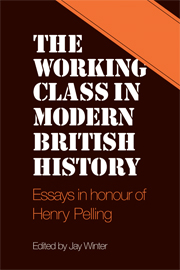Introduction: labour history and labour historians
Published online by Cambridge University Press: 05 November 2011
Summary
Labour history in Britain has changed substantially since its emergence as an academic discipline in the years following the Second World War. Against the background of the defeat of fascism and the sweeping victory of the Labour party in the 1945 general election, the first generation of labour historians aimed to reconstruct the evolution of labour movements. This they did through a painstaking retrieval and reconstruction of the record of the institutions of labour – trade unions, political parties and sects, cooperatives, and educational and religious societies. In terms of this aim, their achievement is undeniable. The question remained, however, as many of them would admit, as to how representative of the history of labouring men and women as a whole is the record of organized struggle? Of course, without institutional history, this question simply cannot be answered. But while admitting that in aggregate terms the labour movement has never recruited more than a minority of the working class, labour historians until recently shared a consensus that the record of its struggles expresses, and indeed embodies, both the aspiration of ordinary people to have a better life and their commitment to change the world in which they live and work.
In contrast, recent developments in labour history reflect a different approach to the question of the relation between movement and class. The aim is to complement (rather than supersede) earlier research by defining labour history as the social history of the working class and not primarily as the political history of militants and militancy.
- Type
- Chapter
- Information
- The Working Class in Modern British HistoryEssays in Honour of Henry Pelling, pp. vii - xiiPublisher: Cambridge University PressPrint publication year: 1983



